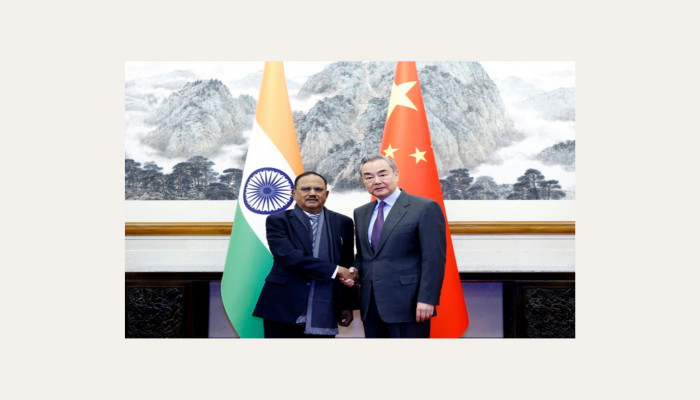India distances from China’s readout of six-point consensus
- In Reports
- 10:30 PM, Dec 21, 2024
- Myind Staff
India on Friday clarified its stance, distancing itself from a Chinese statement that claimed National Security Adviser Ajit Doval and Chinese Foreign Minister Wang Yi had reached a six-point consensus and committed to a “package” deal on the boundary issue during their meeting of special representatives on Wednesday.
The Chinese statement, issued on Wednesday night, referred to the 2005 agreement and the political parameters and guiding principles outlined in that deal for resolving border disputes. Notably, it emphasised bifurcating the boundary issue from the “overall development of bilateral relations,” a position consistently advocated by the Chinese foreign ministry in recent months.
However, the Indian statement countered this narrative, emphasising that border ties remain the cornerstone for determining the overall relationship between the two nations. Significantly, it made no mention of any “six-point consensus,” underscoring India’s differing perspective on the discussions.
“We put out the details of issues discussed in our press release. The two sides have reaffirmed their commitment to exploring a fair, reasonable and mutually acceptable framework for the settlement of the boundary question in accordance with the political parameters and guiding principles agreed in 2005,” Ministry of External Affairs (MEA) spokesperson Randhir Jaiswal said in response to a question from ThePrint, during the regular media briefing.
When pressed again by another journalist on the separate readouts from the special representatives (SR) meeting, Jaiswal said, “What happened in the SR-level talks, we have clearly defined in our press release. I request you to please refer to our press release. If you have any questions about the other press release, you should take it with the other party.”
The Ministry of External Affairs (MEA) spokesperson, while distancing India from the so-called six-point consensus, clarified that the essence of the discussions was reflected in the Indian statement.
In 2005, India and China agreed on the political parameters and guiding principles for settling the boundary issue, emphasising a “package settlement” to address all areas of the boundary between the two nations. While the Chinese statement issued on Wednesday reiterated this commitment to a “package settlement,” the Indian readout notably did not reference this aspect, highlighting a divergence in interpretations of the meeting’s outcomes.
Article I of the 2005 agreement says, “The differences on the boundary question should not be allowed to affect the overall development of bilateral relations. The two sides will resolve the boundary question through peaceful and friendly consultations,” which mirrors Beijing’s demands for resumption of bilateral ties and placing the boundary tensions at its “appropriate place”.
The meeting between National Security Adviser Ajit Doval and Chinese Foreign Minister Wang Yi marked the first interaction in the special representatives’ format since 2019, following the Galwan clashes in the summer of 2020. These clashes led to heightened military presence by both sides in the region, significantly straining bilateral relations.
Amid these tensions, the Kailash Mansarovar Yatra, suspended since 2020 due to the COVID-19 pandemic, has yet to resume. However, the Ministry of External Affairs (MEA) indicated that both special representatives provided a “positive direction” toward the potential resumption of the pilgrimage, signalling a step toward easing bilateral ties.
China has been urging India to resume direct flights between the two countries and to issue visas to Chinese nationals, both of which were disrupted following the Galwan clashes.
Jaiswal clarified that the restoration of full bilateral ties is a “step-by-step” process. The political normalisation between the two nations began after an agreement was reached on 21 October 2024 to disengage at the friction points in Eastern and Southern Ladakh.
Following this, Prime Minister Narendra Modi and Chinese President Xi Jinping held a bilateral meeting on the sidelines of the BRICS summit in Kazan, Russia, on 23 October 2024, marking a significant step in the ongoing efforts to stabilize relations.







Comments